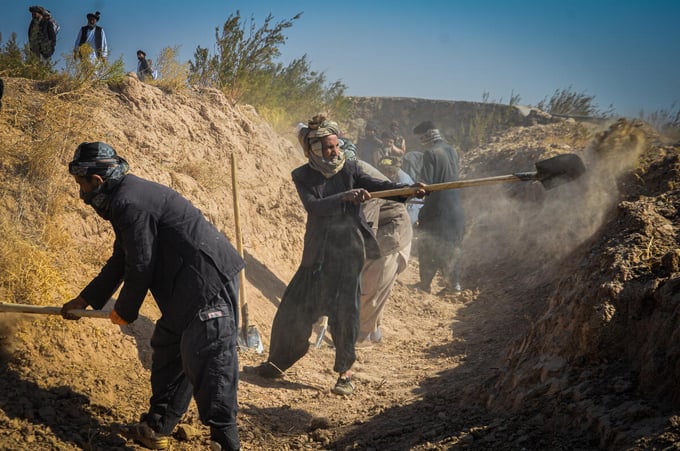May 29, 2025 | 23:15 GMT +7
May 29, 2025 | 23:15 GMT +7
Hotline: 0913.378.918
May 29, 2025 | 23:15 GMT +7
Hotline: 0913.378.918

Construction workers dig trenches before gabions are built on the HariRud-Murghab river basin as part of community irrigation and livelihood enhancement - funded by Japan Government in Herat, Afghanistan.
The Food and Agriculture Organization of the United Nations (FAO) has received $11.9 million in contributions from the Government of Japan to scale up its emergency and resilience activities in humanitarian contexts across Africa, Asia, Europe, and the Middle East. This funding will support 14 critical projects aimed at tackling urgent humanitarian needs.
The funds will be allocated to address the following key priorities: supporting small-scale farmers affected by climatic and economic shocks in Afghanistan; enhancing food security and nutrition in Chad, particularly in regions impacted by the Sudan crisis; providing assistance to displaced households in Mozambique; improving flood management initiatives in Uganda; building agricultural roads and irrigation canals in Mali; managing abandoned, lost, or discarded fishing gear in the West Indian Ocean; catalyzing agricultural investments in Cote d’Ivoire, and others.
“We thank the Government of Japan for this timely contribution. This funding is part of Japan's ongoing commitment to address time-critical needs while fostering sustainable and resilient livelihoods in crisis-affected communities”, said Rein Paulsen, Director of the FAO Office of Emergencies and Resilience.
“Emergency agricultural assistance provides a lifeline to those most severely affected by conflict, climate crisis and economic downturn. This type of support not only saves lives but also empowers communities with the tools to secure their own futures by breaking the cycle of dependency, revitalizing local markets and promoting lasting recovery,” he added.
Long-standing cooperation
Since joining FAO in 1951, Japan has been a key partner and driving force in the global fight against food insecurity. Through its long-standing collaboration with FAO, Japan has significantly contributed to improving food security and nutrition for vulnerable populations, including internally displaced persons, refugees, and communities affected by conflict and natural disasters.
In 2024, Japan reaffirmed its commitment with a substantial contribution of $11.2 million to support FAO’s emergency and resilience activities across Africa, Asia, Europe, and the Middle East. Among others, these include a $3 million project for developing inland fisheries in rural communities in Sri Lanka; responding to floods in East Africa; supporting livelihoods in the conflicted-affected areas of Ukraine; strengthening rural livelihoods in the Cabo Delgado province of Mozambique; increasing the resilience of agriculture and livestock-based livelihoods in Afghanistan; building resilience of flood-affected communities in Mauritania; and improving food security and nutrition outcomes through emergency and early recovery assistance in Northern Ethiopia. In conflict and climate-affected regions like Tigray, where local farmers produced five times more food than external aid in 2021, self-reliance proves its efficiency.
(FAO)

(VAN) Vikas Rambal has quietly built a $5 billion business empire in manufacturing, property and solar, and catapulted onto the Rich List.

(VAN) Available cropland now at less than five percent, according to latest geospatial assessment from FAO and UNOSAT.

(VAN) Alt Carbon has raised $12 million in a seed round as it plans to scale its carbon dioxide removal work in the South Asian nation.

(VAN) Attempts to bring down the price of the Japanese staple have had little effect amid a cost-of-living crisis.

(VAN) Fourth most important food crop in peril as Latin America and Caribbean suffer from slow-onset climate disaster.

(VAN) Shifting market dynamics and the noise around new legislation has propelled Trouw Nutrition’s research around early life nutrition in poultry. Today, it continues to be a key area of research.

(VAN) India is concerned about its food security and the livelihoods of its farmers if more US food imports are allowed.